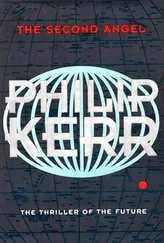‘The barrel?’
‘That’s right.’
‘What do you mean?’
‘You’ll see.’ He looked at his watch. ‘I think we’ll be just in time.’
We finished our drinks and then Trettin drove us northwest to Weissensee and parked on Fröbelstrasse, next to the gasworks. A long line of the city’s poor, some of them barefoot, were waiting to get inside the building opposite while a couple of SA men did their best to recruit new members for the Nazi Party.
‘The Palme,’ I said. ‘Of course.’
With five thousand beds, the Palme was Berlin’s oldest and largest night shelter for the city’s homeless. Support was limited to the bare necessities: accommodation in one of the dormitories for no longer than five consecutive nights, disinfection of clothing, access to personal-hygiene facilities, a plate of soup and a piece of bread mornings and evenings. Berliners sometimes called it the pauper’s Adlon. It was almost as inaccessible: more than two kilometres northeast of the Alex, it was far enough away from any respectable people that no one could have complained.
‘You know, it doesn’t matter where you go,’ I said, ‘it seems there’s a Nazi there ahead of you.’
‘A brown shirt is at least a clean shirt. But if ever those bastards get into power they’ll arrest everyone in this place. Mark my words. They’re recruiting homeless men today, but they’ll be arresting them tomorrow. On the grounds of being a public nuisance or something like that.’
‘They can’t arrest them all,’ I said. ‘Besides, they’d only have to accommodate them somewhere else.’
‘You think that will stop them? I don’t.’
‘Poor bastards.’
‘Why? Because they’re homeless? Listen, for a lot of them that’s the life they’ve chosen. And the rest are just crazy.’
‘I don’t believe that.’
‘It’s true.’
‘You’re hard enough to ice skate on, Otto, do you know that?’
Why it was called the Palme, Trettin didn’t know for sure.
‘It might have been because there used to be a palm tree in the entrance hall,’ he said. ‘At least there was back in 1886, when the Palme got started.’
‘A palm tree? In Berlin? Someone’s idea of a joke, perhaps.’
He pulled a face. ‘I agree, that does sound unlikely.’ He fetched a little tin from his vest pocket and handed it to me.
‘What’s this?’
‘Mentholated camphor. I keep some in my pocket in case I have to attend a police autopsy. Wipe some on your nostrils. It will help with the smell when we’re in there.’
We left the car and, pushing our way through the line of unwashed bodies, went inside. Trettin had been right about the mentholated camphor. The place smelled like a trench on a hot day. Toothless, gnarled grey faces surrounded us; it was like stepping onto the page of some mildewed engraving of grim metropolitan life.
Trettin led the way to the closed-in admissions counter, showed the warder his beer token and asked to see the director.
Five minutes later we were in a large office overlooking the courtyard of the main building. On one wall was a portrait of the Berlin planning commissioner who’d helped found the Palme, and on another a picture of St Benedict Joseph Labre. The director, Dr Manfred Ostwald, was a stout man with white hair and very dark eyes; with his stiff collar and morning coat he reminded me of a badger in a children’s story. On his desk were several copies of a magazine called The Tramp ; he said it was published by the International Brotherhood of Vagabonds, which sounded like a joke but wasn’t. He listened to our request and then invited us to use a newly installed public address system that, he explained, was connected to a loudspeaker in every one of the Palme’s forty dormitories.
‘If I might add a word of advice, gentlemen,’ he said. ‘Write down what you want to say first. That way you won’t repeat yourself and you’ll avoid any hesitation while you work out what to say.’
‘Good idea,’ said Trettin, and then handed me his copy.
‘You want me to read it?’
‘You’ve had more to drink than I have.’
‘What’s that got to do with anything?’
‘You’re relaxed. I get nervous when I read my wife a story in the newspaper.’
‘Yes, well, I’ve seen your wife and that doesn’t surprise me. She’d frighten a hyena with a law degree.’
Trettin chuckled. ‘That she would.’
After reading our appeal for information under my breath several times, I read it out loud into the microphone, and while we waited to see if anyone would come forward, Dr Ostwald pressed a glass of schnapps on us, which was brutal of him, but we weren’t about to complain. There’s nothing like a glass in your fingers to make a line of inquiry seem as if it’s going well. Fifteen minutes passed and then Ostwald’s secretary knocked on the door to tell him that we had someone who wanted to give us some information. But she also added a name that made her boss hesitate.
‘Well, show him in,’ said Trettin. ‘That’s why we’re here, isn’t it?’
By now Dr Ostwald’s hesitation was accompanied by a grimace. ‘Wait, I know this fellow of old,’ he said. ‘Stefan Rühle is one of our regulars and a little bit of a troublemaker. Quite apart from the fact that he will want money, he has some eccentric, not to say lunatic, ideas. And by the way, don’t give him any money, at least not right away, or there’ll be another ten just like him in this office. You spend six minutes talking to this man and if you’re still in your right mind, then you can tell me I was wrong. Otherwise I’ll simply say I told you so.’
‘We can spare him six minutes,’ I said. ‘Even those Nazis outside probably gave him more than that.’
‘All right. Just remember not to swallow all of what he says. Not unless you want your stomach pumped.’ Dr Ostwald waved at his secretary. ‘Show him in, Hanna, dear.’
She went outside and returned trying not to smell the air surrounding the man behind her. He was a shifty, pop-eyed individual, with a cap that looked like it was moss growing on his head, and a jacket that was more grease than wool. Seeing us, he grinned and swung his arms excitedly.
‘You the police?’
‘That’s right.’
‘If you’re the police, where are your warrant discs? I’ll need to see some identification before I say anything. I’m not stupid, you know.’
I showed him my beer token. ‘So. Have you got some information for us, Herr Rühle?’
‘Stefan. Nobody calls me Herr Rühle. Not these days. Not unless I’m in trouble. I’m not in any trouble, am I?’
‘No trouble at all,’ I said. ‘Now then. How about it? Have you any information about this man who’s been killing disabled war veterans?’
‘If I tell you what I know, how can I be sure that you’re not going to kill me?’
‘Why would we want to kill you?’ asked Trettin.
‘You’ll know why when I give you the information you’re looking for. Besides, you’re police. That means you have the right to hurt people like me.’
Trettin smiled patiently. ‘We promise not to kill you, Stefan. Don’t we, Bernie?’
‘Cross my heart and hope to die.’
‘Sounds like a copper’s promise. Which is to say not a promise at all. Maybe if I had a drink. That might help me believe you’re sincere.’
I looked at Ostwald, who shook his head.
‘If you tell us something interesting then we’ll take you out for a beer,’ said Trettin. ‘As many beers as you like if we get a name.’
‘Don’t like beer. Schnapps. I like schnapps. Same as you fellows. I can smell it on your breath.’
‘All right. We’ll buy you a schnapps. Until then, why not have a cigarette?’ Trettin opened his case and let Rühle help himself to several. He put them in his pocket for later.
Читать дальше












